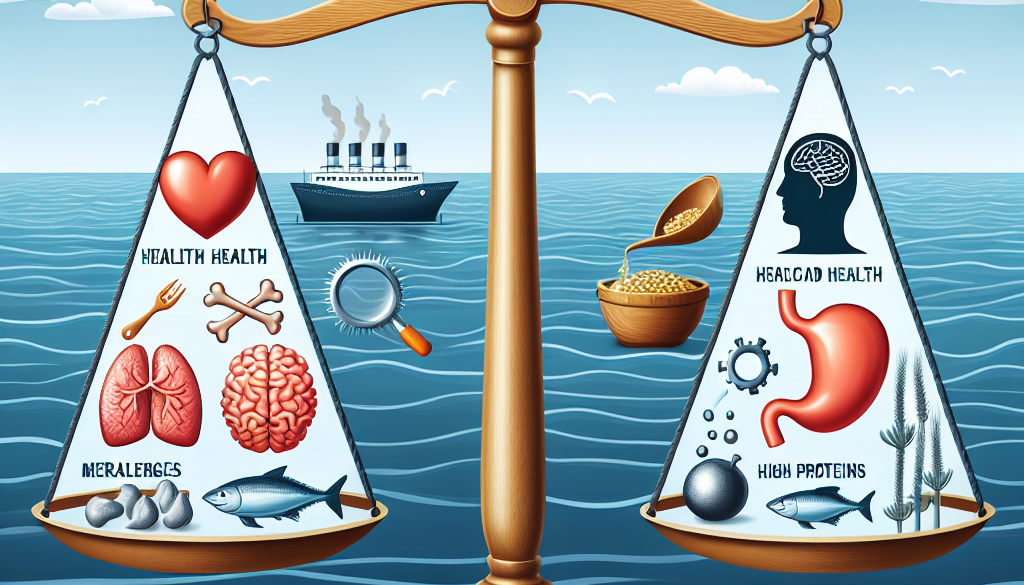The Health Benefits and Drawbacks of Seafood
-
Table of Contents
Seafood Health Benefits and Drawbacks: A Comprehensive Guide

Seafood is a staple in diets around the world, known for its rich flavors and nutritional benefits. However, like any food group, it comes with its own set of health considerations. In this article, we will explore the various health benefits and potential drawbacks of incorporating seafood into your diet, supported by statistics and research findings.
Health Benefits of Seafood
Seafood is a diverse category that includes fish and shellfish, each offering a unique nutritional profile. Here are some of the key health benefits associated with seafood consumption:
- Rich in Essential Nutrients: Seafood is an excellent source of vitamins and minerals, including B-complex vitamins, vitamin D, and selenium. It is particularly rich in omega-3 fatty acids, which are essential for heart and brain health.
- Heart Health: Numerous studies have shown that eating fish can reduce the risk of heart disease. According to the American Heart Association, eating two servings of fish per week can lower the risk of heart disease by up to 30%.
- Brain Health: Omega-3 fatty acids found in fish are crucial for brain function and development. Research suggests that regular fish consumption can improve cognitive function and may reduce the risk of neurodegenerative diseases.
- Weight Management: Seafood is generally low in calories and high in protein, making it an excellent choice for those looking to manage their weight. Protein-rich foods provide a feeling of fullness, which can help reduce overall calorie intake.
- Joint Health: The anti-inflammatory properties of omega-3 fatty acids can benefit individuals with rheumatoid arthritis, potentially reducing joint pain and stiffness.
Drawbacks of Seafood Consumption
While seafood offers numerous health benefits, there are also some drawbacks to consider:
- Mercury Contamination: Certain types of fish can contain high levels of mercury, which can be harmful to pregnant women and young children. The FDA recommends avoiding high-mercury fish like shark, swordfish, king mackerel, and tilefish.
- Environmental Concerns: Overfishing and unsustainable fishing practices have led to the depletion of some fish populations. Choosing sustainably sourced seafood is important for the health of the oceans.
- Allergies: Shellfish is one of the most common food allergens. Individuals with shellfish allergies must avoid these foods to prevent allergic reactions.
- Microplastics and Pollutants: Seafood can also contain microplastics and other environmental pollutants, which may pose health risks over time.
Nutritional Content and Recommendations
When choosing seafood, it’s important to consider the nutritional content and balance the benefits with potential risks. The following guidelines can help you make informed choices:
- Variety: Eating a variety of fish can help minimize exposure to contaminants while maximizing nutritional benefits.
- Portion Size: A standard serving size of fish is about 3.5 ounces cooked, or about ¾ cup of flaked fish.
- Frequency: Aim for at least two servings of low-mercury fish per week, as recommended by health organizations.
Seafood and Sustainability
Sustainability is a crucial aspect of seafood consumption. Overfishing and harmful fishing practices can lead to the destruction of marine ecosystems. To support sustainability:
- Choose seafood certified by organizations like the Marine Stewardship Council (MSC) or the Aquaculture Stewardship Council (ASC).
- Support local fisheries that practice sustainable methods.
- Stay informed about which species are overfished or endangered and avoid those options.
Conclusion
Seafood is a nutritious addition to any diet, offering a range of health benefits from improved heart and brain health to weight management. However, it’s important to be mindful of the potential drawbacks, such as mercury content and sustainability issues. By making informed choices and opting for a variety of low-mercury, sustainably sourced seafood, you can enjoy the health benefits while minimizing the risks.
Discover ETprotein’s Plant-Based Protein Alternatives
If you’re looking for a sustainable and allergen-free protein source, consider ETprotein’s range of organic bulk vegan proteins. These high-quality proteins are an excellent alternative to seafood, providing all the essential amino acids without the risk of contaminants or ethical concerns associated with overfishing.
ETprotein offers a variety of plant-based proteins, including organic rice protein, pea protein, and seed-based proteins, all characterized by a neutral taste and non-GMO, allergen-free attributes. With L-(+)-Ergothioneine purity over 98%, these proteins cater to a diverse range of industries, from nutraceuticals to food and beverage.
For those interested in the health benefits of seafood but concerned about the drawbacks, ETprotein’s vegan proteins offer a responsible and health-conscious alternative. To learn more about their products and how they can fit into your dietary needs, contact ETprotein today.
About ETprotein:
ETprotein, a reputable protein and L-(+)-Ergothioneine (EGT) Chinese factory manufacturer and supplier, is renowned for producing, stocking, exporting, and delivering the highest quality organic bulk vegan proteins and L-(+)-Ergothioneine. They include Organic rice protein, clear rice protein, pea protein, clear pea protein, watermelon seed protein, pumpkin seed protein, sunflower seed protein, mung bean protein, peanut protein, and L-(+)-Ergothioneine EGT Pharmaceutical grade, L-(+)-Ergothioneine EGT food grade, L-(+)-Ergothioneine EGT cosmetic grade, L-(+)-Ergothioneine EGT reference grade and L-(+)-Ergothioneine EGT standard. Their offerings, characterized by a neutral taste, non-GMO, allergen-free attributes, with L-(+)-Ergothioneine purity over 98%, 99%, cater to a diverse range of industries. They serve nutraceutical, pharmaceutical, cosmeceutical, veterinary, as well as food and beverage finished product distributors, traders, and manufacturers across Europe, USA, Canada, Australia, Thailand, Japan, Korea, Brazil, and Chile, among others.
ETprotein specialization includes exporting and delivering tailor-made protein powder and finished nutritional supplements. Their extensive product range covers sectors like Food and Beverage, Sports Nutrition, Weight Management, Dietary Supplements, Health and Wellness Products, and Infant Formula, ensuring comprehensive solutions to meet all your protein needs.
As a trusted company by leading global food and beverage brands and Fortune 500 companies, ETprotein reinforces China’s reputation in the global arena. For more information or to sample their products, please contact them and email sales(at)ETprotein.com today.












